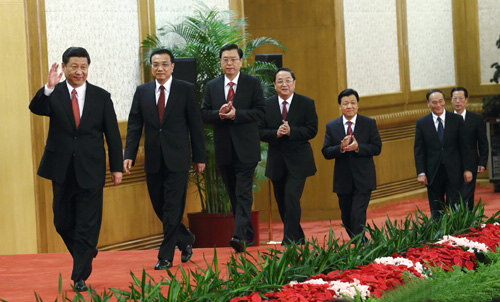|
 |
|
NEW HELMSMEN: General Secretary of the CPC Central Committee Xi Jinping and the other newly elected members of the Standing Committee of the 18th CPC Central Committee Political Bureau Li Keqiang, Zhang Dejiang, Yu Zhengsheng, Liu Yunshan, Wang Qishan and Zhang Gaoli (left to right) attend a press event in Beijing on November 15 (XU JINGXING) |
Chinese Vice President Xi Jinping made his debut as the new leader of the ruling Communist Party of China (CPC) on November 15 with a strong mandate to continue the country's economic miracle, improve the lives of the 1.3 billion Chinese people and to tackle problems ranging from a growing income gap to corruption.
Appearing before a press conference at the Great Hall of the People in Beijing together with six other newly elected leading members of the Party, the 59-year-old CPC General Secretary told reporters with great confidence, "We are greatly encouraged by both the trust all the comrades of the Party have placed in us and the great expectations the people of all ethnic groups in China have of us, and we are keenly aware that this is also an important responsibility for us."
"Our people have an ardent love for life. They wish to have better education, more stable jobs, more income, greater social security, better medical services and healthcare, improved housing conditions, and a better environment. They want their children to have sound growth, have good jobs and lead a more enjoyable life," he added.
"To meet their desire for a happy life is our mission," Xi stressed.
The seven officials, all members of the Standing Committee of the CPC's Political Bureau, compose the top leadership of China's ruling party. Xi was also named chairman of the CPC Central Military Commission.
At the National People's Congress to be held next spring, some of them will be elected or appointed to high-ranking government posts with five-year terms, formally taking the reins of the world's second largest economy.
While Xi is expected to assume the presidency to succeed Hu Jintao, 57-year-old Vice Premier Li Keqiang, who is second in rank among the top seven, is widely assumed to replace Wen Jiabao as premier.
With extensive experience at the grassroots level, Xi "understands the feelings of ordinary people and is closely in touch with them," said Shi Yongming, an associate research fellow with the China Institute of International Studies. Also, he is good at handling international relations and capable of coping with complicated situations, Shi added.
Xi started his career as Party secretary of a village before rising steadily through the ranks. As China's vice president since 2008, he has assisted President Hu Jintao in state affairs including foreign relations. His widely watched trip to the United States in February helped bolster mutual understanding between China and the United States. He also showed a people-friendly image as he returned to an Iowa town that he visited 27 years ago as a local official from north China's Hebei Province.
Of the seven new senior officials, only Yu Zhengsheng, former Party Secretary of Shanghai, majored in technology at college. The other six majored in social sciences such as economics, political science and history. In the previous Political Bureau Standing Committee, only Xi and Li were students of liberal arts. The other seven held degrees in areas such as hydraulic engineering, geology and geophysics.
"The new leaders are full of vigor," said Shen Beili, a delegate to the 18th CPC National Congress from the International Department of the CPC Central Committee. "They will build on the achievements of their predecessors to scale new heights."
Shen said she pins great hopes on these leaders. "Under complicated and changing international and domestic circumstances, they will undertake arduous tasks as they lead Chinese people in building a moderately prosperous society. But I'm confident they will accomplish a lot," she added.
The leaders were elected by members of the 18th CPC Central Committee at its first plenary session, held the day after the conclusion of the 18th CPC National Congress on November 14. At the congress, more than 2,300 delegates approved a report by Hu Jintao, General Secretary of the 17th CPC Central Committee, charting the course for China's development in the years ahead. They also cast votes to elect the 205-member 18th CPC Central Committee.
| 